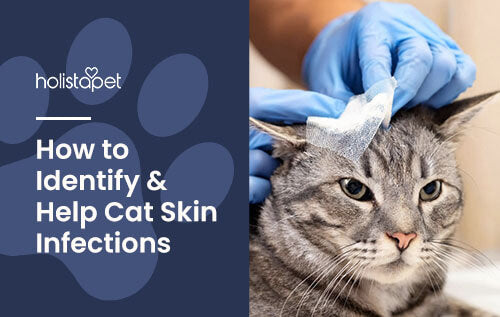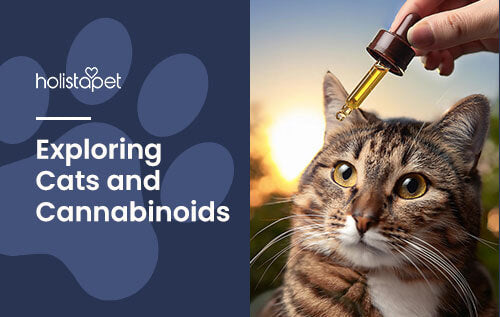From flaky skin to pesky flea bites, a cat skin infection can make even the most laid-back feline feel cranky to their wits end. These irritating conditions often lead to excessive scratching, bald patches, and more.
Luckily, understanding the causes and finding the right solutions can get your furry friend purring again. Whether it's an allergic reaction, a bacterial invasion, or something more serious, tackling these issues head-on ensures your cat stays comfy and thriving!
What Are Cat Skin Infections?

A feline skin infection happens when irritants like bacteria, fungi, or parasites take a toll on your pet's skin. These infections often appear as redness, crusty lesions, or itchy spots that drive your kitty crazy.
When untreated, these cat skin conditions can lead to bigger problems. Thankfully, most cases are manageable with proper care and attention.
Common Types of Skin Infections in Cats
Feline skin infections can come in many forms. Here are some of the most common culprits:
- Bacterial Infections. Bacterial skin infection can develop from a bite wound, injury, or inadequate grooming. You may notice redness, swelling, or crusty abrasions.
- Fungal Infections. Ringworm and yeast infections fall into this category, causing flaky skin and hair loss.
- Parasitic Infections. Flea bites, ear mites, and other external parasites in a cat's body can irritate the skin and trigger infections.
- Allergic Skin Conditions. Food allergies or environmental triggers often cause common allergic skin disease and secondary infection.
How Skin Infections Impact a Cat's Health
Skin problems make your cat uncomfortable, not to mention affect their health and well-being. Constant scratching and irritation can lead to hair loss and skin lesions. Affected cats may even develop secondary skin infections.
These issues might spread when left untreated, bringing more discomfort and complications. Addressing these skin conditions promptly helps keep your feline companion feeling their best.
Causes of Skin Infections in Cats
Skin infections in cats often have a sneaky culprit behind them. The causes can vary widely, from pesky parasites to bacterial troublemakers. Allergies, environmental irritants, and even bite wounds can pave the way for these irritating conditions.
Understanding the root cause is key to keeping your kitty's skin healthy. Let's look at some common triggers that might be bothering your feline friend.
Bacterial and Fungal Infections
Bacterial and fungal infections are frequent troublemakers. Bacteria often sneak in through bites or scratches, leading to redness, swelling, or crusty scratches.
Meanwhile, fungal infections like ringworm or yeast thrive in warm, moist areas. They cause flaky skin and bald patches.
These infections can spread quickly. Catching them early and seeking treatment can save your cat from extra discomfort. Proper hygiene also goes a long way.
Parasites and Allergies

Fleas, ticks, and ear mites can irritate the skin, causing intense scratching and infections. On the other hand, allergies—whether from food, flea bites, or the environment—can trigger redness and flakiness.
If left untreated, both issues can lead to secondary infections. Protecting your pet from skin parasites and identifying allergens is crucial for their comfort and skin health.
Related Post: Harvest Mites In Cats Explained + Helpful Tips
Environmental Factors Contributing to Skin Infections
Your cat's environment plays a big role in their skin health. Damp or unclean areas can encourage fungal infections, while outdoor adventures might expose them to parasites or allergens.
Even stress or changes in temperature can impact your kitty's grooming habits, leading to skin issues. Creating a healthy environment is an easy way to keep skin infections at bay.
Recognizing Symptoms of Cat Skin Infections
Spotting skin infections in cats early is the key to tackling them effectively. Itchy skin, hair loss, or flakiness can be early warning signs. If your cat's symptoms suggest itchiness or discomfort, it's time to investigate further. Recognizing these signs quickly can help you get your feline companion the care they need.
Common Signs To Watch For

Skin infections can show up in many ways, so knowing the signs is essential. Here are a few symptoms to keep an eye on:
- Excessive Scratching. Your cat may constantly scratch or bite at their skin, indicating itchiness or irritation.
- Hair Loss. Bald spots or thinning fur can signal underlying issues like infections or allergies.
- Flaky Skin. Dry, flaky patches often suggest fungal infections or poor grooming.
- Crusty Spots: Scabs might develop from scratching or bacterial infections.
- Head Shaking. If paired with ear mites or irritation, frequent shaking of the head can be a red flag.
When To Seek Veterinary Attention
If your pet's skin infection symptoms persist or worsen, it's time to call the vet. Signs like severe scratching, open wounds, or extensive fur loss need prompt attention.
A professional can provide a proper diagnosis and create a treatment plan tailored to your kitty's needs. Early intervention is the best way to help your feline friend feel better fast.
Can CBD Help Cats With Skin Infections?
Some good news? CBD (cannabidiol) may offer a natural way to support feline skin health.
The compound's soothing properties may help reduce irritation and discomfort while promoting overall wellness. Whether your kitty's dealing with flaky patches or frequent scratching, CBD could complement their care routine and help them feel more at ease.
How CBD May Support Skin Health
CBD may support your cat's skin health by interacting with their body to promote comfort, calmness, and balance. CBD interacts with your pet's endocannabinoid system (ECS), a complex network of receptors that helps regulate many body processes, including skin health. By promoting balance in the ECS, CBD may help soothe irritation and encourage overall wellness.
Fun fact: HolistaPet's CBD cat products include hemp oil, which offers added benefits for skin care. Hemp oil is rich in omega fatty acids, which can nourish your pet's skin and coat. HolistaPet products are a fantastic choice for pet parents seeking a natural addition to their cats' wellness routine.
Potential Benefits of CBD for Discomfort and Itching
CBD may help with discomfort and itching by supporting your cat's natural calming processes. Here are some potential benefits:
- May Soothe Irritated Skin. Helps ease redness and swelling from skin infections or allergies.
- Promotes Relaxation. Encourages calmness, which can reduce scratching.
- Supports Healing. Hemp oil in CBD products can nourish and rejuvenate the skin.
HolistaPet CBD Options for Cats
At HolistaPet, we offer all-natural, vegan-friendly, and third-party lab-tested CBD products designed specifically for cats. Using premium, broad-spectrum CBD, these products are a perfect addition to your cat's wellness routine:
- CBD Oil for Cats. This concentrated oil is easy to use and supports your kitty's well-being with a blend of broad-spectrum CBD and other cannabinoids. We offer it in original, chicken, and salmon flavor.
- CBD Cat Treats. Delicious salmon- or chicken-flavored treats with 2mg of CBD per bite. Perfect for picky eaters!
- CBD Cat Chews. Soft, salmon-flavored chews with 2mg of CBD, ideal for relaxation and daily care.
- CBD Capsules. Precisely measured plant-based capsules for an easy and effective CBD boost.
Treating and Preventing Cat Skin Infections
Treating and preventing skin infections in cats starts with a proper diagnosis and a proactive approach. Regular grooming, clean living spaces, and parasite control all help keep their skin healthy.
For infections, treatments can include medicated shampoos, oral medications, or soothing remedies like CBD. Addressing underlying causes, like food allergies or external parasites, also helps prevent future issues.
Veterinary Treatments for Skin Infections
Veterinary treatments for feline skin infections often target the root cause. Your vet may prescribe antibiotic treatment for bacterial infections or anti-fungal medications for fungal issues.
In some instances, medicated shampoos or topical creams can provide relief. For severe cases, oral medications work better to address deeper infections.
Natural Remedies for Skin Infections
Natural remedies can complement veterinary care to help soothe your pet's skin. Options like oatmeal baths or coconut oil may help reduce irritation and moisturize the skin.
Holistic alternatives like CBD products can also support skin health and comfort. These gentle approaches work best with a vet-approved treatment plan.
Tips for Keeping Your Cat's Skin Healthy
Healthy skin starts with simple, consistent care. Here are some easy tips to help your feline companion stay itch-free and fabulous:
- Brush Regularly. A good brushing removes dirt and loose hair while keeping their coat shiny.
- Maintain a Clean Environment. Keep bedding and living areas tidy to minimize exposure to irritants.
- Protect Against Parasites. Use vet-approved flea and tick preventatives to avoid pesky infestations.
- Feed a Balanced Diet. Nutrient-rich food supports your cat's overall skin health and coat quality.
- Check for Signs of Trouble. Regularly inspect their skin for flakes, redness, or unusual bumps.
Final Thoughts - Addressing Cat Skin Infections
Caring for your cat's skin is a must for their comfort and well-being. Proactive care—through regular grooming, vet visits, and natural solutions like CBD—keeps your furry friend comfy and happy.
HolistaPet's premium CBD products are a fantastic option for pet parents looking to support their pets' skin health naturally. Give your feline friend the love and care they deserve, and they'll thank you with purrs and cuddles!







![Probiotics For Dogs [Soft Chews] - HolistaPet](http://www.holistapet.com/cdn/shop/files/Probiotic-Infographic-1_472d7a29-e30c-435a-9638-1365d8c3a9f9.jpg?v=1725384841&width=104)



























Leave a comment
All comments are moderated before being published.
This site is protected by hCaptcha and the hCaptcha Privacy Policy and Terms of Service apply.